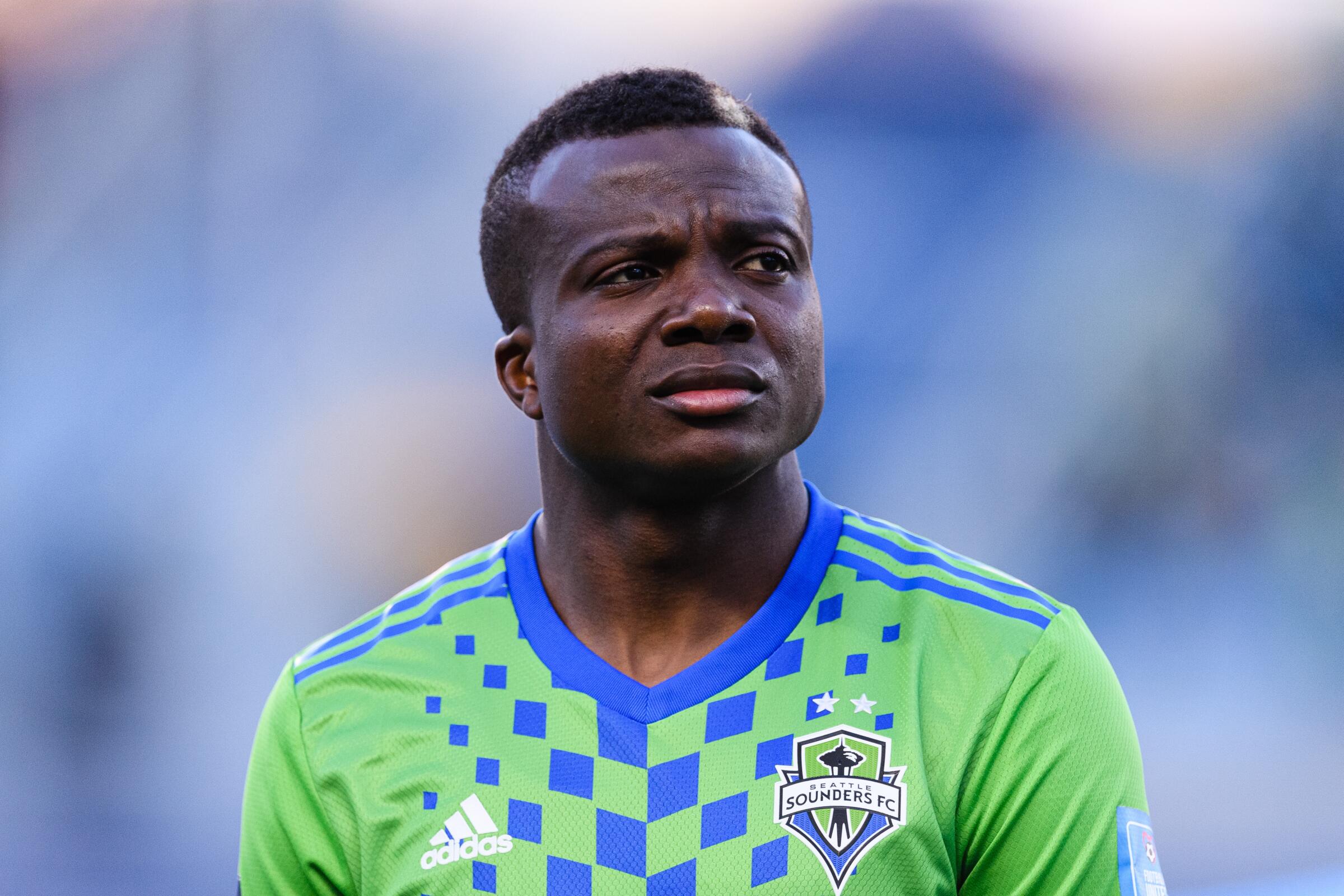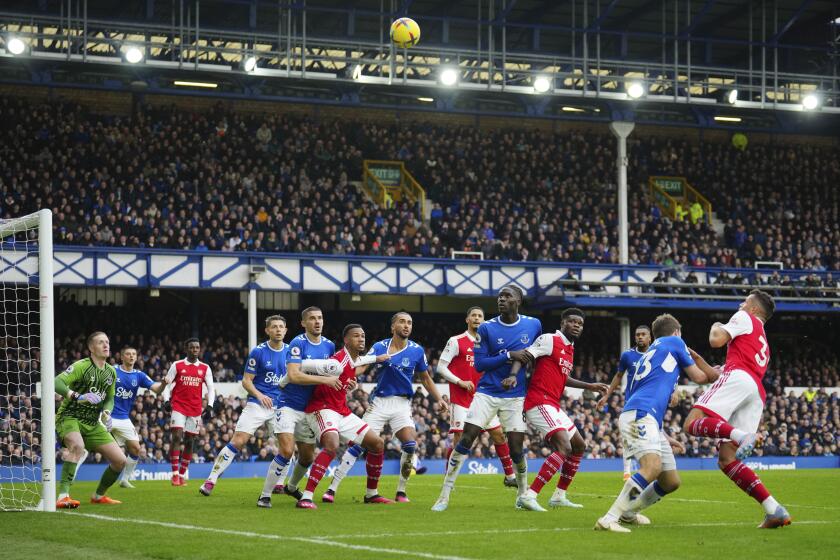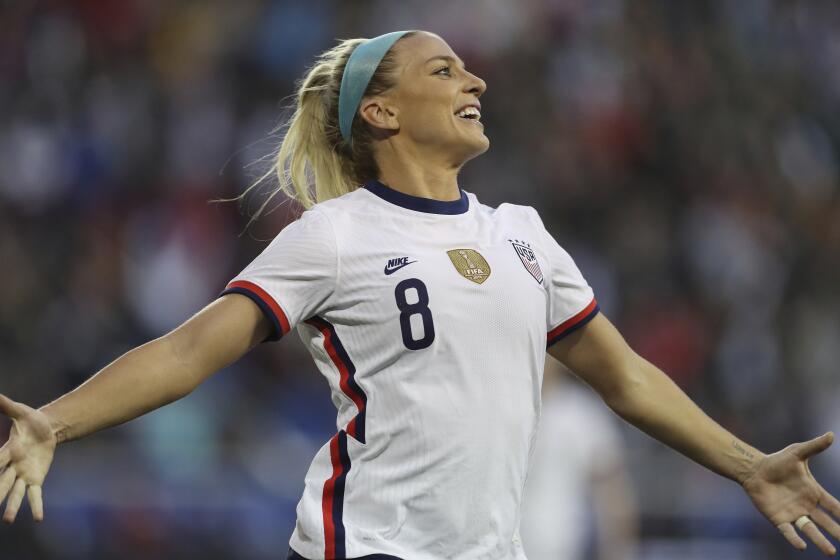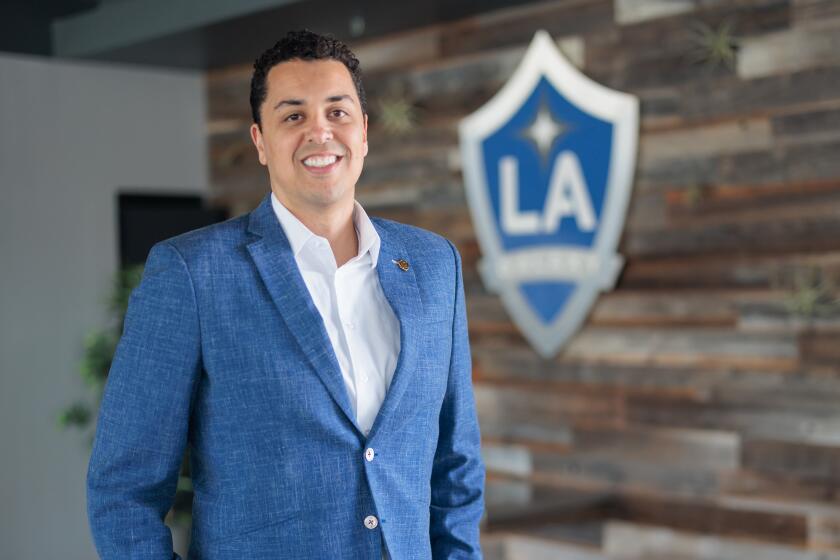Kevin Baxter writes about soccer and hockey for the Los Angeles Times. He has covered seven World Cups, four Olympic Games, six World Series and a Super Bowl and has contributed to three Pulitzer Prize-winning series at The Times and Miami Herald. An essay he wrote in fifth grade was voted best in the class. He has a cool dog.
1
Ten minutes into the Seattle Sounders’ home match with St. Louis City this month, referee Rubiel Vazquez blew his whistle to stop play, made a drinking motion with his hand, then pointed to the Seattle bench.
For Sounders defender Nouhou Tolo, a devout Muslim, that was the signal the sun had set and he could end his Ramadan fast by taking a drink and having a quick snack. The moment also fed his soul.
“I was very emotional,” Tolo remembered. “For MLS to do that for us, it was pretty special.”
This season MLS joined the English Premier League and Germany’s Bundesliga in allowing officials to pause games to permit players to break their daily Ramadan fasts. It’s a gesture the league, one of the most diverse in the world with players from approximately 80 countries, approved before the start of the month-long observation of Ramadan, when Muslims are required to not only pray and reflect, but also fast, forgoing even water from dawn to sunset.
Barring a turnaround, Everton seems destined to play its final season at historic Goodison Park in the Championship division, and fans aren’t happy.
“We think diversity is important. We think inclusivity is important,” said Jeff Agoos, MLS’ senior vice president for competition and medical administration. “And important to this whole equation is that the players’ health and safety is prioritized. So if we can pause the game, even for a short time where there’s no competitive impact, we want to try to support our players.”
Agoos said the idea, which was rolled out quietly, has received wide support. The National Women’s Soccer League adopted an identical policy, although it has not yet been used since the league has few players observing Ramadan, which ends Thursday.
For some players, the medical benefits are secondary. Vancouver Whitecaps wing back Ali Ahmed, like Tolo, said the recognition from the league was more meaningful.
“It’s a big sign of respect. I’m extremely grateful,” said Ahmed, who made his MLS debut during Ramadan a year ago. “Not many other leagues have done this. They’ve been very, very accommodating.”
In addition to the in-game break, Ahmed said his team arranged for him to have a room in which to pray and when the Whitecaps are on the road, they arranged for both the predawn suhur meal at 5 a.m. and the post-fast iftar.
“The team nutritionist has been setting me up with everything when I’m home or on the road,” he said. “The league, the team has been super-duper accommodating and respectful. It’s so lovely to see them recognize and respect our faith.”
Planned hydration breaks are common in games played in unusually hot or humid weather, and the Ramadan breaks are no different in that every player on the field can come to the sideline for a drink. The way the policy works, Agoos said, is teams alert the referees in a pre-match meeting if there is a Muslim player in the starting lineup who would like a sustenance break after sundown. The officials also are told at what time the player’s fast can end and it then becomes the responsibility of the center referee to pause play during the first stoppage, such as a goal kick or a throw-in.
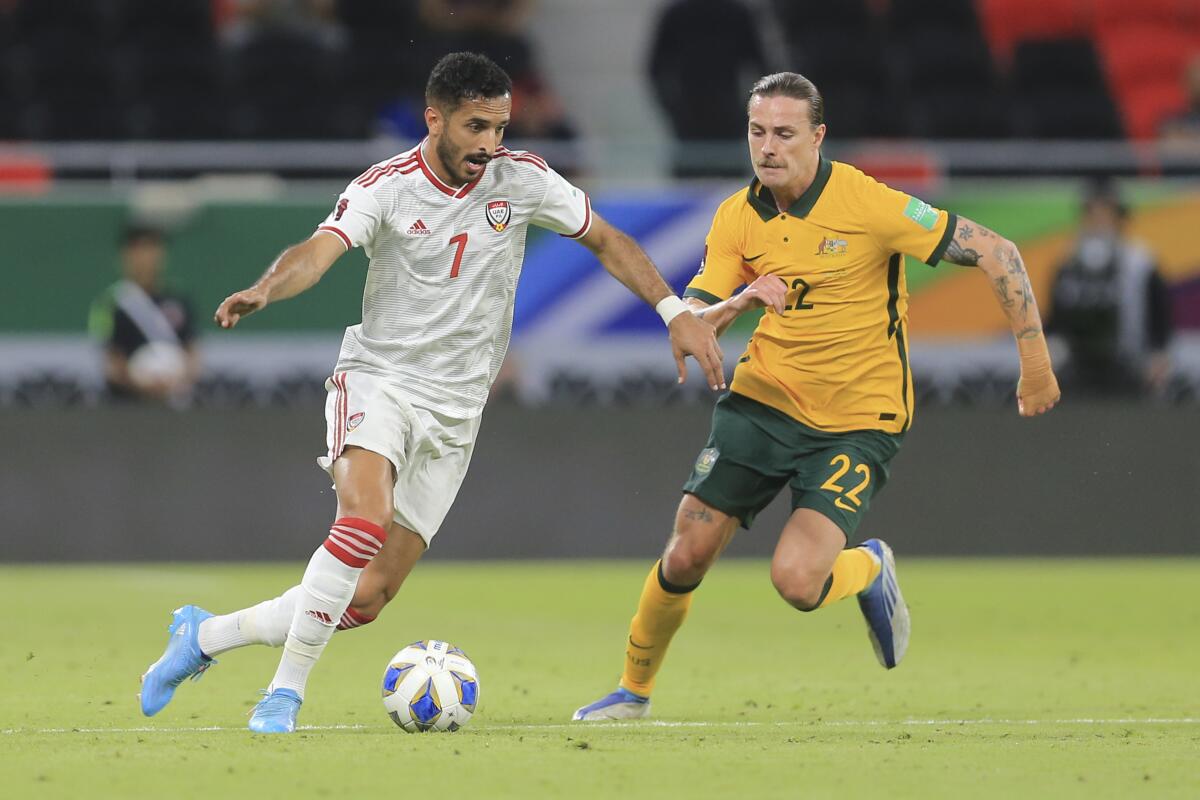
Ali Ahmed of the United Arab Emirates, left, controls the ball in front of Australia’s Jackson Irvine during a match in June 2022.
(Hussein Sayed / Associated Press)
“These are players that are acknowledging a religious belief. It doesn’t change the game, it doesn’t hurt the game.”
— Greg Vanney, Galaxy head coach, on potential stoppages during play to accommodate fasting players
On the bench assistant coaches or trainers wait with water and sports drinks as well as easily digested, high-energy snacks such as bananas, sports gels, gummies and dates. Breaks are supposed to last no longer than a minute, but teams and officials have been flexible.
Every Muslim has played through Ramadan since they were young, so most have learned to how to compete while fasting.
“We’re so used to it, we’re conditioned to it,” said Omar Zeenni, the goalkeeper coach for LAFC’s team in MLS NEXT Pro, a third-tier developmental league that adopted the same game-break policy.
Still, the breaks are welcome. “Something small, just to kind of push us through would be very, very helpful,” Zeenni said.
“Fasting is very much a mind over body exercise,” added Omar Ricci, spokesman for the Islamic Center of Southern California. “It is amazing what you can do if you put your mind to it, how you can direct your body, going without food and going without water.”
But the nutrition break, he said, “is accommodative to the Muslim players in a way that’s not impacting the game.”
Two-time World Cup champion Julie Ertz, who stepped away from soccer to give birth to her son, has signed a one-year contract with Angel City.
The Premier League is believed to have been the first major league to pause a game in recognition of Ramadan in 2021, when teams were playing in empty stadiums because of the coronavirus lockdown. Such stoppages are now common in the EPL.
“It is great and should be universal, especially when teams are playing as Muslim players are breaking their fast,” said Ben Osu, the senior lead equity and inclusion officer at Liverpool’s Everton FC. “Players of all faiths have welcomed it, which is nice to see.”
Compare that with France’s Ligue 1, home to dozens of Muslim players. Officials there reportedly sent an email to referees prohibiting stops in play.
“Football takes no account of the political, religious, ideological or trade-union considerations of its actors,” the email said.
In fact, some French teams have held Muslims out of games rather than have them play while fasting.
The MLS and NWSL policies haven’t had much effect on Southern California’s first-division teams since backup goalkeeper Eldin Jakupovic is the only Muslim with LAFC; there are none on the Galaxy and Angel City FC. But Galaxy coach Greg Vanney, who played with Muslims in France and coached them in Toronto, said the idea is overdue.
Will Kuntz and Will Misselbrook will have to play big roles in turning around a Galaxy team that is winless heading into its El Tráfico showdown with LAFC.
“It’s respectful,” he said. “These are players that are acknowledging a religious belief. It doesn’t change the game, it doesn’t hurt the game. If somebody can have a minute or two to get some nourishment in their body and to be able to move forward, I have no issue.”
For Ricci, that educational component is just as big as the health reasons behind the breaks.
“It may cause curiosity and people would then just want to understand a little better. I think what we’re starting to see is the evolution of Muslims in sports,” he said.
“I think MLS can provide a model for other leagues around the world to consider and implement.”
⚽ You have read the latest installment of On Soccer with Kevin Baxter. The weekly column takes you behind the scenes and shines a spotlight on unique stories. Look for it every Tuesday morning at latimes.com/soccer. Listen to Kevin Baxter on this week’s episode of the Corner of the Galaxy podcast.
